Key takeaways:
- State-sanctioned violence, including the death penalty, raises ethical concerns, especially regarding its irreversible nature and potential for wrongful executions.
- The death penalty disproportionately affects marginalized communities, highlighting systemic injustices within the legal system.
- Alternatives to the death penalty, such as restorative justice and life imprisonment without parole, emphasize rehabilitation over retribution.
- Grassroots activism and community engagement are essential for advocating against state violence and promoting a more humane justice system.
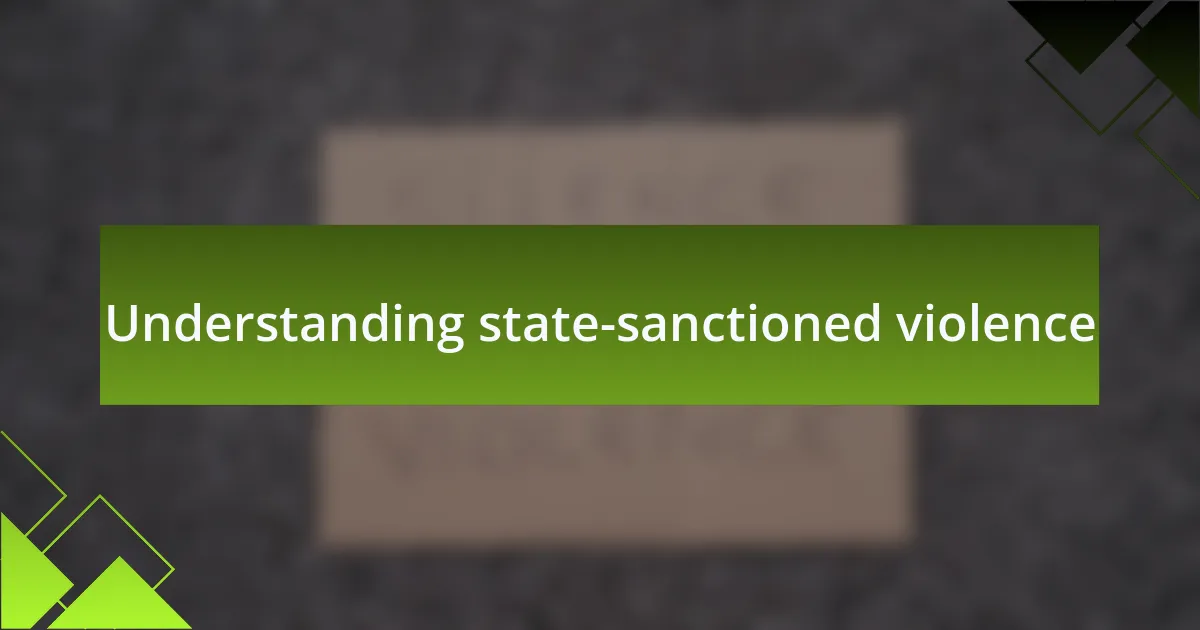
Understanding state-sanctioned violence
State-sanctioned violence refers to acts of aggression or harm that a government legally authorizes against individuals, often under the guise of maintaining order or justice. I remember when I first learned about this concept; it struck me that something labeled as “justified” could still cause immense suffering. It made me question—can a society truly call itself civilized when it condones violence as a tool of governance?
In many cases, state-sanctioned violence manifests through practices like police brutality or capital punishment. I vividly recall hearing stories from friends about their traumatic encounters with law enforcement, which opened my eyes to the reality that many people live in fear of those who are supposed to protect them. This conflict raises a fundamental question: how do we reconcile safety with the risk of violent enforcement?
Through my own experiences and reflections, I’ve come to realize that state-sanctioned violence often disproportionately impacts marginalized communities. Observing the disparity in treatment made me wonder: why does our system prioritize punitive measures instead of rehabilitation? This conversation is crucial as it invites us to reconsider our understanding of justice and the ways we can create a more equitable society.
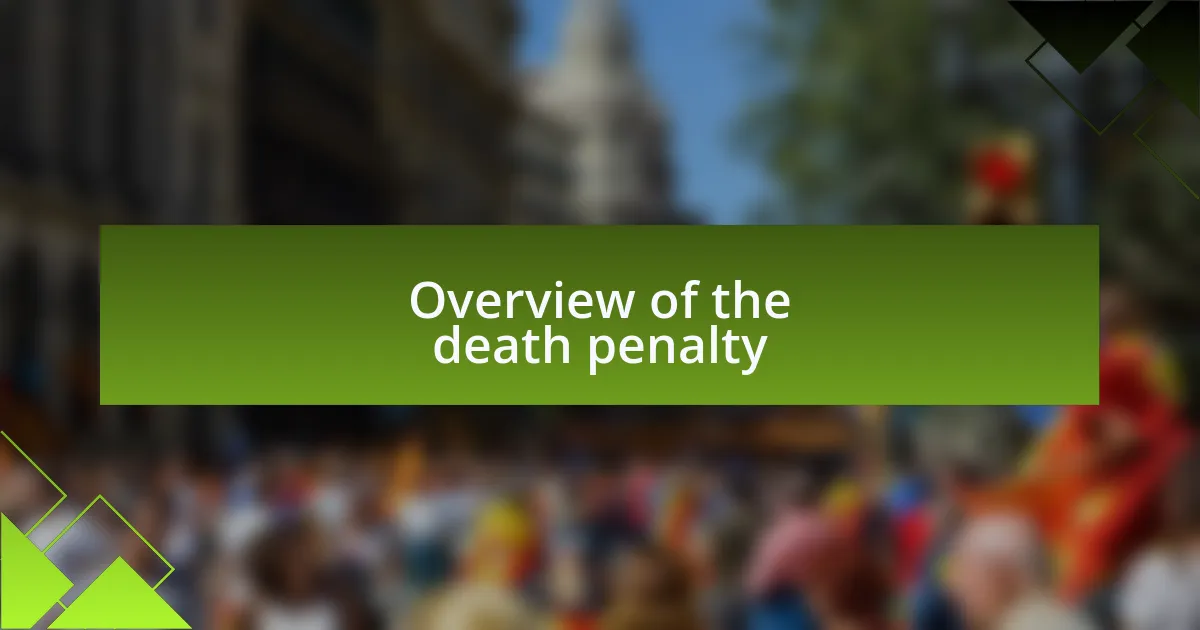
Overview of the death penalty
The death penalty, often referred to as capital punishment, is a legal process where a person is executed by the state as a punishment for a crime, typically severe offenses like murder. I still remember the unsettling feeling I had during a discussion with friends about whether it truly serves justice or simply perpetuates a cycle of violence. It raises a significant question: does taking a life in response to a crime truly deter future crimes, or does it merely reflect a societal tendency to resolve conflicts through violence?
Statistically, the application of the death penalty reveals significant disparities; it disproportionately affects individuals from lower socioeconomic backgrounds and marginalized communities. I can’t help but think of a friend who shared his family’s struggles with systemic injustice, which made me reflect on how the death penalty may not be an equalizer after all. How can we claim to uphold justice if our systems inherently favor certain groups over others?
This form of state-sanctioned violence also ignites fierce debates about morality and ethics. I often find myself wrestling with the ethical implications of allowing a government to take lives. When I see stories of wrongful convictions, it leaves me with a chilling realization: if even one innocent person faces execution, what does that say about our justice system? These considerations invite us to explore deeper values surrounding life, humanity, and the kind of society we want to nurture.
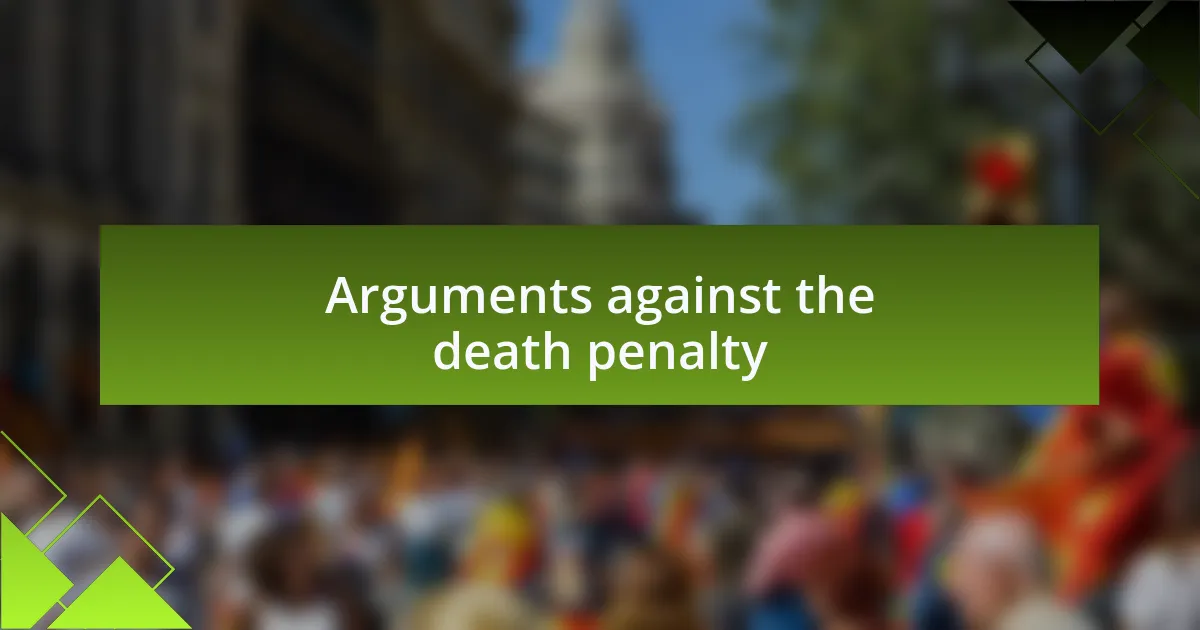
Arguments against the death penalty
The death penalty raises profound ethical concerns, particularly regarding its irreversible nature. I recall a documentary I watched about a man who spent years on death row only to be exonerated shortly before his execution. It made me wonder: how can we justify a system that leaves room for such devastating mistakes? The risk of executing an innocent person is a haunting reality that cannot be overlooked.
Moreover, capital punishment fails to act as a genuine deterrent to crime. In conversations with friends who work in law enforcement, I’ve often heard that offenders rarely contemplate the consequences of their actions in the heat of the moment. This realization challenges the long-held belief that fear of execution will steer potential criminals away from violence. What if, instead of fear, we shifted our focus towards rehabilitation and prevention?
Finally, I’ve seen firsthand how the death penalty can strain community resources and divert funds from critical social programs. Friends who work in social justice often emphasize that investing in education and mental health services could lead to a more profound impact on crime reduction than execution ever could. Isn’t it time we consider solutions that uplift our communities rather than perpetuate cycles of violence?
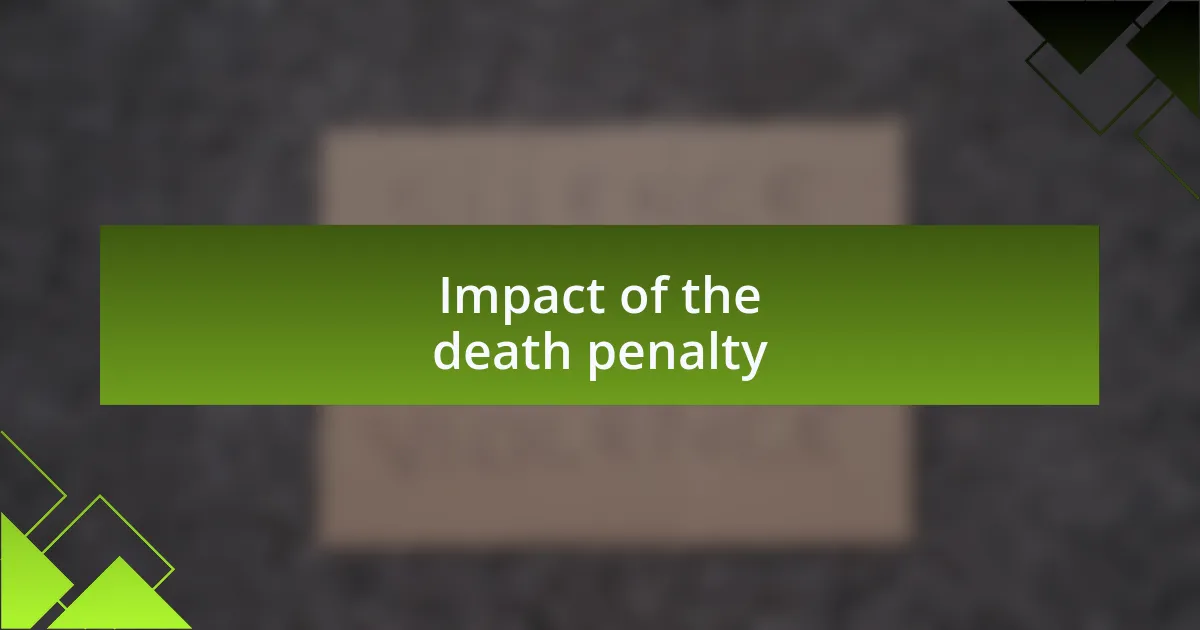
Impact of the death penalty
The impact of the death penalty extends far beyond the individual being executed; it ripples through families and communities. I once met a woman whose brother had been sentenced to death. She shared the emotional toll it took on her family, describing it as a slow, painful strain that felt like a death sentence for them too. How can we overlook the anguish experienced by the loved ones left behind, caught in a never-ending cycle of grief and uncertainty?
Additionally, there’s the question of societal values. When a state endorses capital punishment, it sends a troubling message about the value of human life. I often think about how this acceptance of violence reflects on our collective conscience. Are we not, in some way, condoning a brutality that goes against the very principles of justice and rehabilitation we strive to uphold?
Furthermore, the death penalty disproportionately affects marginalized communities, highlighting deep-rooted injustices within our legal system. I remember a conversation I had with a law student who passionately explained how racial bias often influences sentencing. It made me reflect: if our justice system is meant to serve everyone fairly, why do we see such glaring disparities in who faces execution? Addressing the death penalty means confronting these uncomfortable truths about inequality and striving for a more just society.
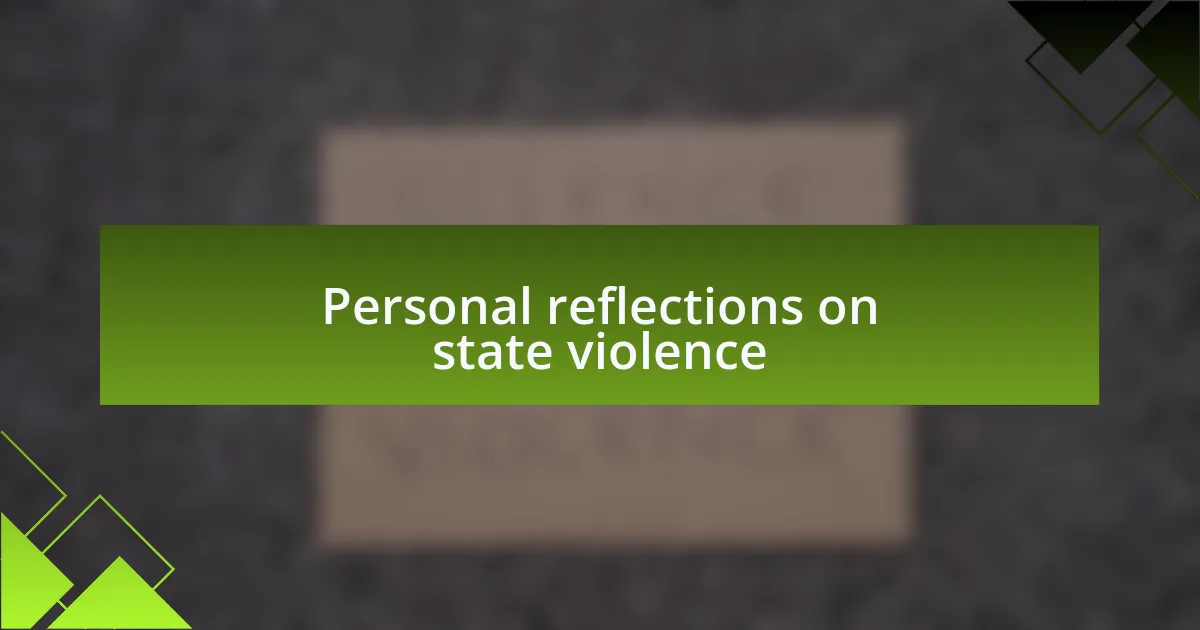
Personal reflections on state violence
There’s something profoundly unsettling about the notion of state violence; it often feels like we’re caught in a paradox. I recall attending a community meeting where a survivor of violence spoke out, recounting how the execution of a loved one didn’t bring peace, but instead deepened the scars. It struck me then: how can the state justify taking a life in the name of justice when it simply perpetuates a cycle of pain?
As I ponder the complexities of state-sanctioned violence, I can’t help but question our moral compass. I’ve witnessed the anxious looks exchanged in discussions surrounding the death penalty; it’s as if everyone is grappling with an unspoken truth. Are we really willing to place our faith in a system that relies on acts of violence to resolve conflicts? This question lingers in my mind, a constant reminder of the ethical dilemmas we face.
In quieter moments, I reflect on how the normalization of state violence affects not just individuals but the societal fabric as well. I remember a walk through my neighborhood, where conversations around capital punishment echoed amongst friends. It made me realize that every discussion shapes our collective understanding of justice. So, how do we move forward if our responses to violence are simply breeding more violence? This thought haunts me, emphasizing the urgent need for transformative change.
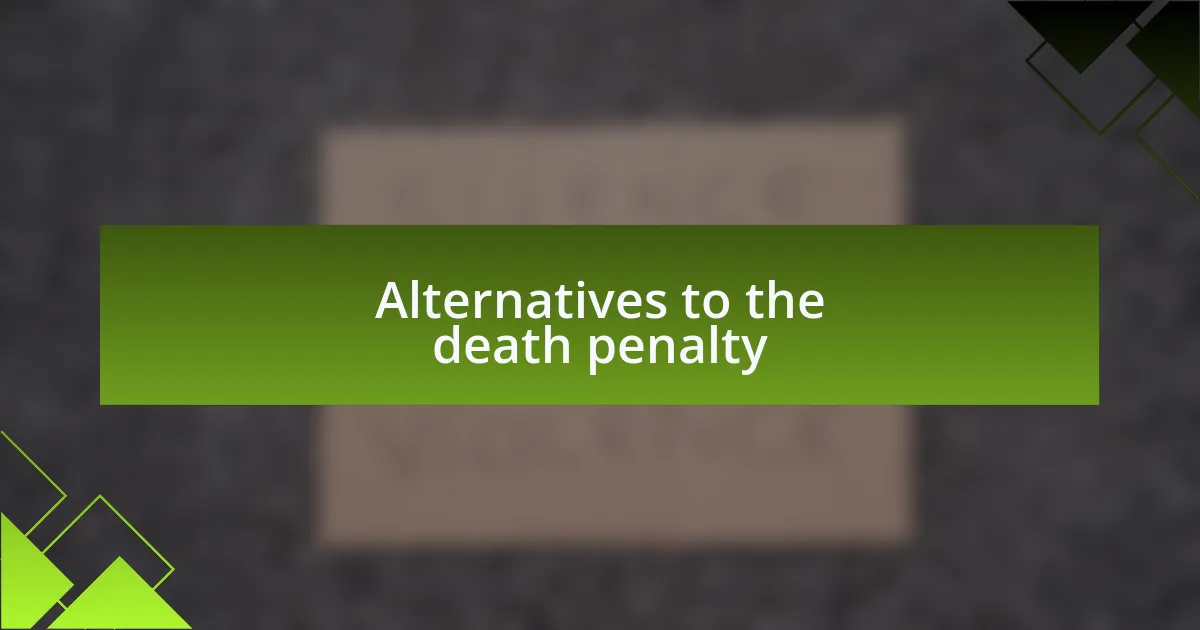
Alternatives to the death penalty
Exploring alternatives to the death penalty opens up a world of possibilities for justice that doesn’t rely on state-sanctioned violence. I remember a conversation with a restorative justice advocate who shared a powerful story about a victim and an offender meeting face to face. The transformative encounter led to healing, not just for the victim’s family, but for the offender as well. Isn’t it fascinating how dialogues can create a bridge rather than a divide?
Another compelling alternative is life imprisonment without the possibility of parole. I once spoke with a former prison warden who emphasized how this option allows for accountability while avoiding the irreversible nature of execution. He noted how it opens the door for rehabilitation programs, offering inmates a chance to reflect on their actions and re-enter society as changed individuals. Doesn’t this approach align better with a vision of justice that prioritizes redemption over retribution?
Lastly, consider community service as a form of punishment for less severe offenses. I’ve seen firsthand how engaging offenders in meaningful community work fosters a sense of responsibility and connection. It makes me wonder: can we cultivate a culture of healing instead of one defined by harsh penalties? By investing in community-based solutions, we not only address the root causes of crime but also promote a more compassionate approach to justice.
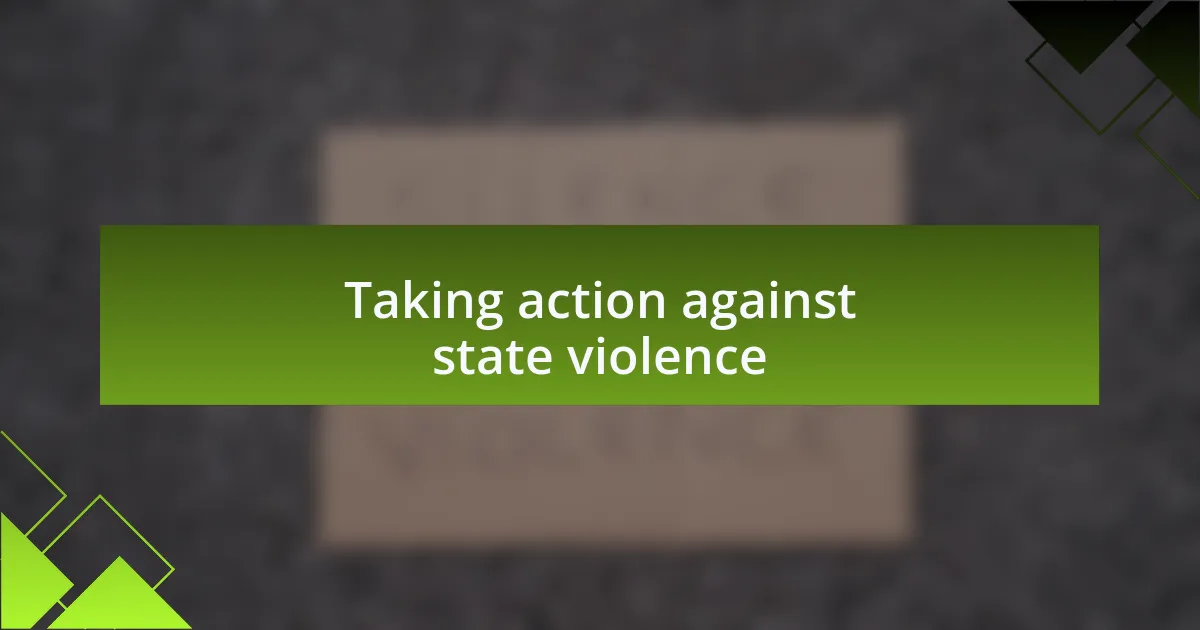
Taking action against state violence
Taking action against state violence involves mobilizing communities to advocate for a more humane justice system. I recall attending a rally where survivors of wrongful convictions spoke passionately about their stories. Their courage resonated deeply, sparking conversations about the need for systemic change. Have you ever felt the weight of injustice? That’s a feeling that fuels passionate activism.
Grassroots organizations play a crucial role in challenging state violence. I remember volunteering with a group focused on legislative reform; it was eye-opening to see how informed voices could influence policy decisions. One night, we brainstormed strategies to raise awareness about the flaws in the death penalty system. It was striking to realize how much collective effort can shift public perception and demand change.
Moreover, engaging in dialogue with lawmakers is essential. I had a chance to meet with a local representative who seemed genuinely interested in understanding the impact of state-sanctioned violence. Sharing the stories of those affected by these policies was powerful. What if we took those personal narratives to heart? By humanizing the issue, we challenge the very foundation of state violence and advocate for a justice system that genuinely reflects our values.